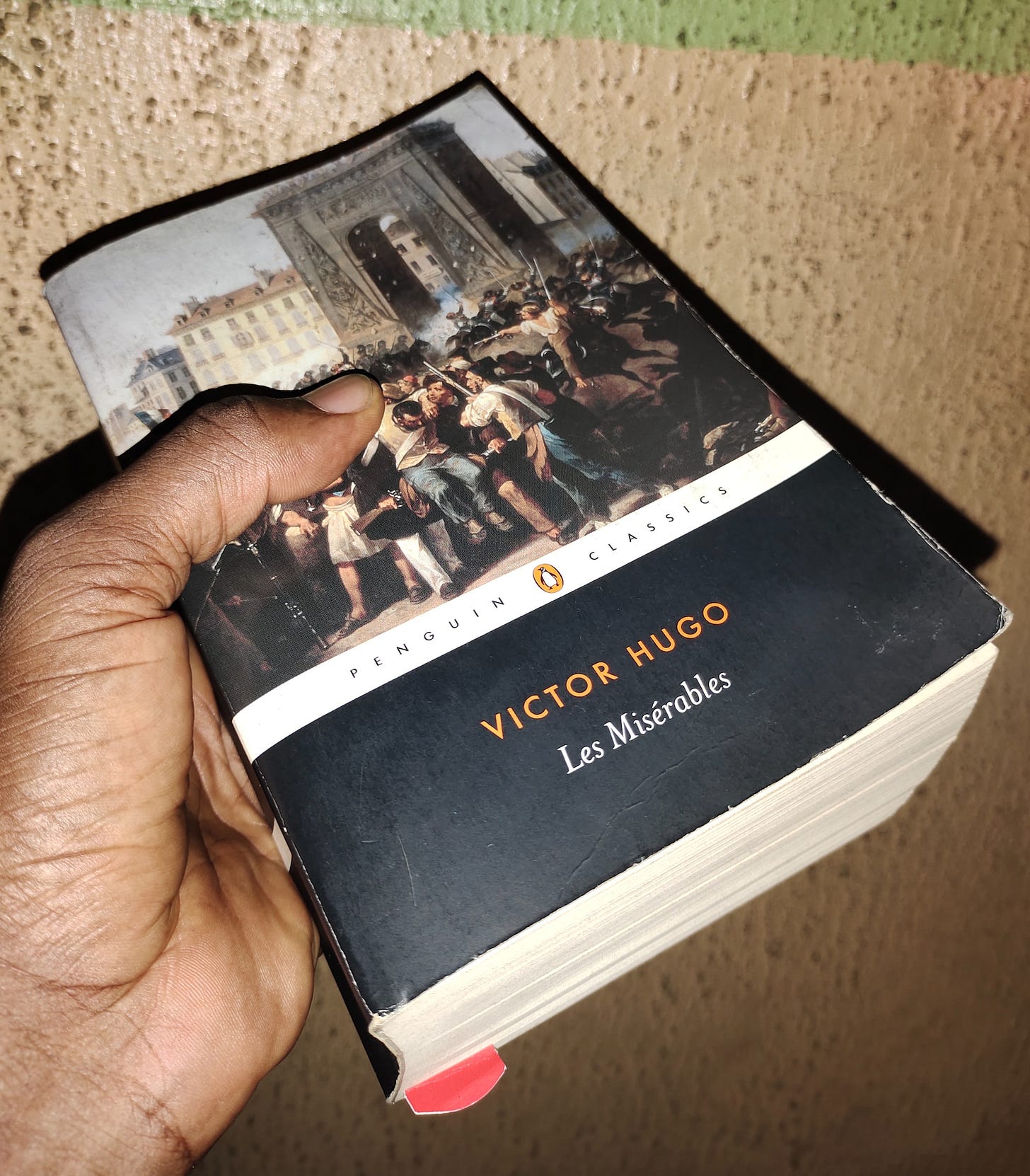Through the Infinite Mind of Victor Hugo's, Les Miserables
Book Review:Transforming injustice into heroism, love, vindication, and ultimate redemption.
I've been into Victor Hugo's Les Miserables, going leisurely at it since the end of January. Reputed to be one of the longest pieces of European literature in English language, I, at last, finished this behemoth on June 1st.
Les Misérables is simple. It is the story of an escaped convict, Jean Valjean, who determined to reform after being saved by the Bishop of Digne. Recalcitrant and implacable, Javert, the policeman wants to see him rightfully punished according to the law - life imprisonment as a galley slave.
Fantine, a dead prostitute entrusted her illegitimate daughter, Cosette, into Valjean’s care. We see the sinister thread of a relentlessly evil inn keeping couple, the Thénardiers, and their urchin children, Éponine and Gavroche.
We also met and followed the course of Marius, who falls in love with Cosette, and who is the son of a Napoleonic hero who died believing wrongly that he had once been saved on the field of Waterloo by Thénardier, who was in fact a scavenging thief.
“The introduction described the book as “a sort of essay on the infinite” and that, “That is why its tempo is so explicit with slowness, syncopated with digression.”
According to the author, Victor Hugo, “This book is a tragedy in which infinity plays the lead”, while “Man plays a supporting role.”
“The author dare his bourgeois readers to consider their responsibility for a society that drove men to crime, and women to prostitution - a poor man persecuted by a system in which justice has been overshadowed by the law.
Conservatives denounced a book that presented a criminal as a hero. Pope Pius IX placed Les Misérables on the Church’s Index of proscribed books, and copies were publicly burned in Spain
In Paris and all around the world, Les Misérables solidified Hugo’s reputation as the champion of the poor and the enemy of tyranny. The novel was devoured by everyone from Tolstoy and Dostoyevsky to soldiers on both sides of the American Civil War.”
In Les Miserables, you read the story of a condemned criminal, who suffered for 19 years for the petty crime of stealing bread to feed his sister and her starving children.
Finally, out of prison, Jean Valjean's efforts at penance and reformation were constantly thwarted by his relentless nemesis and law enforcer, police officer, Javert.
The translation, with a reading time of over 70 hours, is the equivalent of 7 to 10 average-sized modern fiction or nonfiction writing.
I bought the hardcopy version in 2011 (via Washington DC airport), but I only got to reading it 12 years later.
The novel ended joyfully at 90% since the remainder (with over 7 hours more to plod through) contains the accompanying explanatory notes many of which I’ve already read via the eBook in-text hyperlinks.
Indeed, this is one of those "… you ought to read this book, at least once in your lifetime" titles.
It's a story of society's inexorable and at times pitiless high-handedness (in the name of justice). A story of love, self-sacrifice, redemption, and vindication.
You will journey through the battle of Waterloo, and into the streets of Paris with the fighters of The French Revolution 1830s.
You will get lost in and out of many boring seemingly out-of-context almost infinite details. The thrill and the depths of timeless human nature you discover will prove more than worth it, when you finally arrive at the other side - vindication, reconciliation, and redemption.
My Favorite Quotes
“So here you are! Monsieur Pontmercy, you forgive me!” Jean Valjean repeated.
At those words, coming once more from Jean Valjean, all that was welling up in Marius’s heart found an outlet and he burst out: “Cosette, do you hear that?
Typical! He asks me to forgive him. And do you know what he did for me, Cosette? He saved my life! He did more than that. He gave me you. And after saving me, and after giving me you, Cosette, what did he do with himself? He sacrificed himself. That’s the kind of man he is. And to me the oblivious, the pitiless, the guilty, the ungrateful wretch, he says: Thank you!
Cosette, if I spent my whole life at this man’s feet, it would be too little. The barricade, the sewer, the furnace, the cesspit—he went through it all for me, for you, Cosette! He carried me through every form of death, driving death away from me and accepting it for himself.
Every form of courage, every form of virtue, every form of heroism, every form of saintliness, he has the lot! Cosette, this man is an angel!”
“Shhhh! Shhh!” Jean Valjean whispered. “Why say all that?”
“But what about you!” shouted Marius with a fury verging on veneration. “Why didn’t you say anything? It’s your fault, too. You save people’s lives, and you hide it from them! You do more than that, you slander yourself while you’re pretending to unmask yourself. It’s appalling.”
“I told the truth,” answered Jean Valjean.
“No,” Marius retorted, “the truth is the whole truth and that you did not tell. You were Monsieur Madeleine. Why didn’t you say so? You saved Javert, why didn’t you say so? I owe my life to you, why didn’t you say so?”
“Because I thought as you did. I felt you were right. I had to go away. If you’d known about that sewer business, you would have made me stay with you. So I had to keep quiet. If I had spoken out, it would’ve upset everything.”
One advantage of ebooks over hard copies is that the former version enables me to store and easily recall for review those quotes and profound timeless anecdotes that arrested my attention while reading.
Going through the quotes is like walking through the sands of a shoreline bestrewed with beautiful seashells. Every new discovery seems to be more enchanting than the last.
And yet More Quotes
It is a terrible thing to be happy! How we content ourselves with it! How easily we find it to be the be-all and end-all! How easily, having attained that false aim of life, happiness, we forget the real aim, duty!
The devil, who is cunning, took to hating man; man, who is even more cunning, took to loving woman. In this way, he did himself more good than the devil did him harm.
“Who is that man?” asked Bossuet.
“A man,” replied Combeferre, “who saves others.”
Marius added in a grave voice: “I know him.”
This assurance was enough for everyone. Enjolras turned toward Jean Valjean.
“Citizen, welcome.”
And he added: “You know we are going to die.”
Jean Valjean, without answering, helped the insurgent he had saved get into his uniform.
Source
Victor Hugo, Les Misérables (Translated by Julie Rose, with Introductuion by Adam Thirlwell), Copyright © Random House Inc. 2008
Thank you for reading. This review was originally published here by the author.
Connect with me on Discord or Reddit to share your insights.






